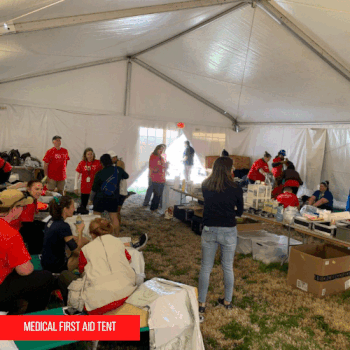Even though the Virginia Medical Reserve Corps is the volunteer program for the Virginia Department of Health, many are uncertain HOW the VA MRC volunteers can assist with their local public health workforce.
Have you heard any of these myths or misconceptions before?
-
-
-
- Volunteers are not reliable; won’t show up when needed most
- Volunteers can’t be trusted; will need constant supervision
- Volunteers are “medically vulnerable”; the mission is too risky
- Volunteers are untrained (for this mission)
- There are no qualified volunteers in my District
- The situation is too urgent; don’t have time to deploy volunteers
-
-

These misconceptions have been proven to be inaccurate. Read through this slide deck as our State Coordinator, Mike Magner, provides evidence as to how the myths are BUSTED!
Utilizing MRC Volunteers to Augment Health District Operations 10.2022
WHO IS THE MRC?
The Virginia Medical Reserve Corps is the Virginia Department of Health’s volunteer program responsible for recruiting, credentialing, and coordinating volunteers to support daily public health initiatives and emergency response. In the wake of the September 11, 2001 attacks, thousands of Americans volunteered their skills and talents to assist their fellow neighbors, while many others asked, “What can I do to help?”. The Virginia Medical Reserve Corps was established as a national network of volunteers, organized locally to improve the health and safety of their communities. To this day, each of the 25 local MRC units across Virginia is comprised of medical and non-medical support volunteers who remain ready to assist whenever they are called upon.
WHO ARE OUR VOLUNTEERS?
VA MRC volunteers are community members passionate about public health with a desire to serve their community. VA MRC volunteers come from many different backgrounds and walks of life; their variety of knowledge and skills combine to create well-rounded, proficient units capable of filling nearly any public health need. Our volunteer database includes, but is not limited to: students, retirees, business professionals, and health care providers.
ENSURING THE SAFETY OF THE VOLUNTEERS AND THOSE THEY SUPPORT
In preparation for service, volunteers undergo a background investigation conducted by the Virginia State police, a New Volunteer Orientation, and complete any additional required training according to the position in which they will be assigned. We make all efforts to ensure our deployed volunteers are qualified and equipped to fulfill their requested duties. All MRC Volunteers providing medical support require appropriate licensure and work under the license of the local Health Director. They are covered for liability by both Virginia and federal law. For deployments outside of Health Department initiatives, Memorandums of Understanding or Agreement (MOU/MOA) are executed before deployment outlining the responsibilities’ of both parties.
HOW CAN VOLUNTEERS EXPAND YOUR WORKFORCE?
Don’t limit your impact! The Virginia Medical Reserve Corps Volunteers are trained and qualified to
support a wide variety of missions. Below are missions in which VA MRC Volunteers have supported, but this list does not limit their capability.
HEALTH DISTRICT SUPPORT
Answering Phones & Filing Paperwork · Program Support for Women Infant Children (WIC), Family Planning, etc. · Interpretation & Translation · Clinic Support for Dental, Sexually Transmitted Infection (STI), TB, etc. · Environmental Health Field Work · Food Safety Education/Restaurant Outreach · Lab Testing Assistance · Community Health Assessment Surveys (CASPER, CHA-CHIP, MAPP) · Office of the Chief Medical Examiner (OCME) Operational Support
PUBLIC HEALTH EDUCATION & HEALTH SCREENING
RADON Information & Kit Distribution · Infection Prevention · Lyme Disease · Infant Car Seat Installation · Nutrition & Exercise · Breastfeeding · Cardiovascular Disease · Diabetes · Tobacco Cessation · Vision & Hearing · School Physicals · Blood Pressure · Weight, Height, BMI
LIFE SAVING EDUCATION & RESPONSE
AED Training · Until Help Arrives · Project Lifesaver · Fire Alarm Battery and Wellness Checks · N95 Fit Testing (Staff, Volunteer, Community Partners) · Heimlich Education · CPR · Drug Take Back · REVIVE! Training · Medication Disposal Kit Distribution · Naloxone Dispensing · First Aid Support
EMERGENCY PREPAREDNESS & RESPONSE
Mass Dispensing · Shelter Support · Emergency Preparedness Education · Behavioral Health Support · Point of Dispensing Exercises (Clinical, Logistical, Administrative Roles)
DISEASE OUTBREAK & VACCINATION
Contact Tracing · Communicable Disease Investigations & Screening Clinics · School Immunization · Rabies (Pets) · Influenza · COVID · MonkeyPox
Have a program or idea that is not listed?
Reach out to your local MRC representative for help creating a plan to fill any local or regional needs.
WHEN & HOW TO REQUEST VOLUNTEER SUPPORT?
- Consistently work with your local Unit Coordinator to create ways to engage MRC volunteers efficiently and effectively.
- Provide detailed information on opportunities so Coordinators can assign appropriate volunteers.
- Be open to new ideas and opportunities.
- Visit vdh.virginia.gov/mrc/contact/ to find the contact information for your local MRC representative.
- For additional questions, email us at vamrc@vdh.virginia.gov.
